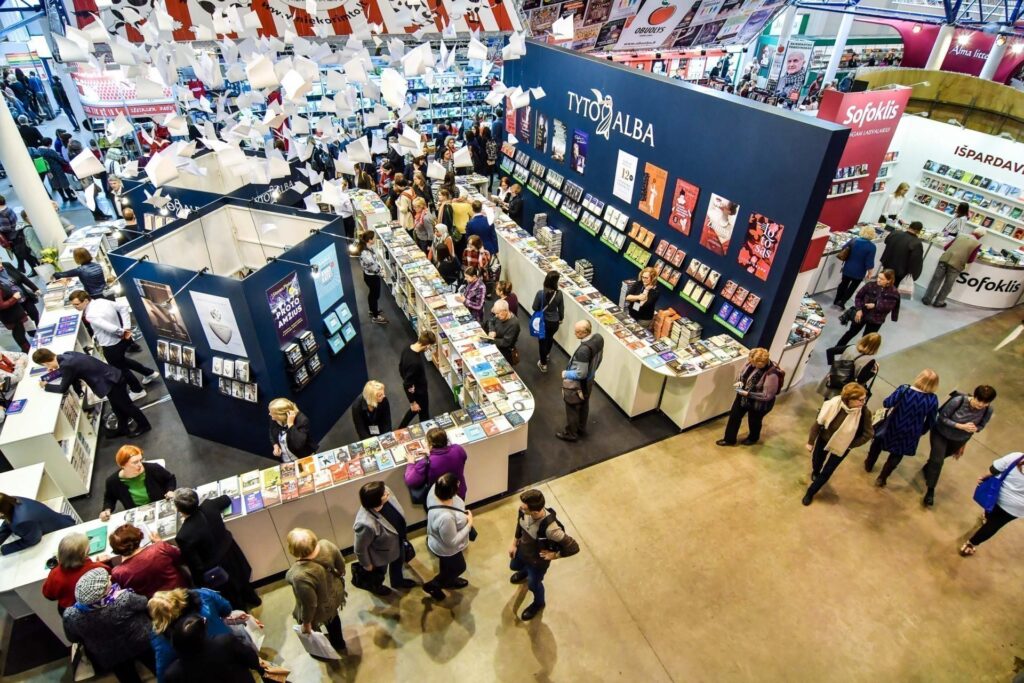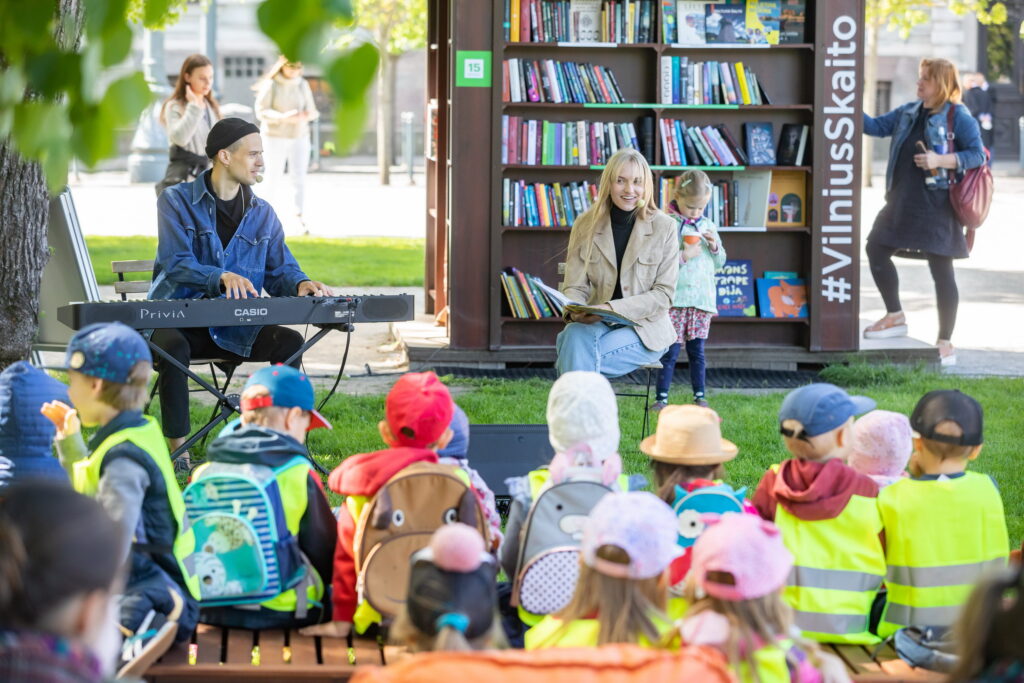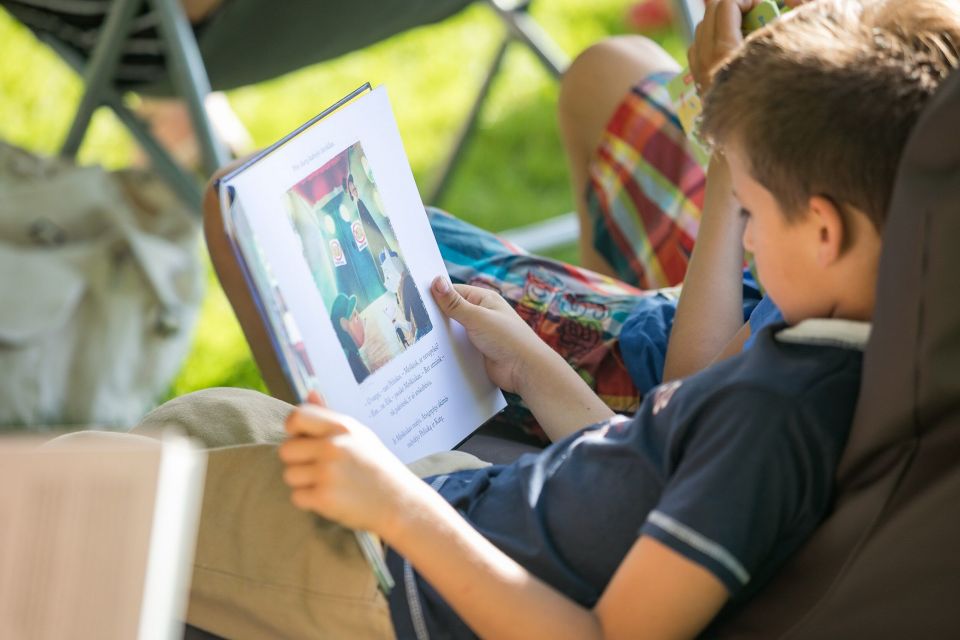Reading the
other
Why is Vilnius a literary city?

The literary heritage of Vilnius is multicultural, colorful, and unique.
Books published as early as in the 16th century in Vilnius were written in Ruthenian, Polish, Latin, Yiddish and Hebrew, and Latvian and Lithuanian languages. Vilnius was home to a number of famous writers who have mentioned it in their works – A. Mickiewicz, R. Gary, J. I. Kraszewski, C. Milosz, J. Brodsky.

The International Vilnius Book Fair is the largest book fair across the Baltic States
and attracts foreign publishers and provides a range of different events for professionals of all fields. The annual fair’s participants are creative professionals, publishers, and scholars. It attracts more than 70000 visitors! It operates not only as cultural event but as an investment that allows publishers to increase their profits.

Vilnius has the Children literature festival.
It organises around 50 various events and meetings throughout a period of three days. Literary events held in the city’s schools (151 schools operate in Vilnius, of which 10 are music and art schools) comprise various forms of readership that include children from primary classes to high school students.

Vilnius University is one of the foremost institutions conducting scientific research and concerned with scholarly and experimental developments.
It is the alma matter of many famous Lithuanian writers, poets, and literature critics, from such historical names as M. K. Sarbievijus and Žygimantas Liauksminas, poet and Nobel laureate Czesław Miłosz, to contemporary authors.

18 public libraries are operating in Vilnius, which had employed 121 professional librarian and which annually attract over 1 million visitors.
Vilnius also has specialized libraries as well as the National Martynas Mažvydas Library, and libraries of the city’s universities. In seeking to increase access to literature for all social groups, the city oversees the establishment of little libraries and outdoor reading spaces in parks and other public areas.
Why is Vilnius a literary city?
Vilnius has always been known as a city of literature, where famous authors have written in various languages and captured its beauty in their internationally renowned works. Literary genres have developed here, and the whole city is marked by literary symbols.
Vilnius is home to a number of independent bookshops, it hosts international literary festivals, book launches, readings, and other events. The vast majority of publishing houses in Lithuania are also located in Vilnius. The Martynas Mažvydas National Library of Lithuania has been actively running in Vilnius for more than 100 years, and the International Vilnius Book Fair, the largest book fair in the Baltic States, will be held for the 24th time in 2024.
Vilnius is deemed a literary city by a number of representatives of other literary cities who have visited Lithuania, and who have attended the International Vilnius Book Fair and/or other literary events and organisations. In fact, even the history of our city coincides with literary signs as we celebrate the birthday of Vilnius on the 25th of January. On this day, in 1323, for the first time ever, Vilnius was mentioned in a letter written by Gediminas, the Duke of the Grand Duchy of Lithuania. In the letter, Vilnius is described as an open city to all nations, all languages, and all creative people. Thereby, as a UNESCO City of Literature, Vilnius invites you to “Read the Other”.

Kotryna Zylė and Miglė Vasiliauskaitė have designed a logo to represent the literary status of Vilnius, drawing attention to the multi-cultural history of Vilnius, to the inherited mission to read the other as well as the neighbour. The letter V with the symbol of an ellipsis is meant to emphasise the city’s openness, the dialogue between cultures, writers and readers, between different nationalities and social groups, between creators, between the city’s inhabitants and its visitors.
We hope that this status will spread the message to Europe and the rest of the world about Vilnius’ achievements in and contributions to literature. We hope that by becoming one of the UNESCO Cities of Literature, Vilnius will be able not only to learn, but also to share its experience.
What is Vilnius committed to do as a city of literature in the coming years?
Improving competencies:
Vilnius will hold events oriented toward the improvement of writers and professionals of respective fields. It will hold regional-scale knowledge exchange events in partnership with other UCCN cities and offer joint programmes to attract creatives to the region as opposed to the more difficult task of bringing them to separate cities.
Infrastructure:
Art residencies will offer both soft (curatorship, mentorship, training) and hard (spaces for creative work) infrastructure. Vilnius will foster its existing art residencies and initiate the founding of new ones, thus enriching its network of writers and translators by attracting foreign creatives.
Literature for the universal education of children:
the city will initiate new bibliotherapy activities aimed at children and adults. The cultivation of literary competences and knowledge will expand awareness in children and young adults; educational efforts will combine different topics. The city will initiate the founding of little libraries.
People movement:
Vilnius is a very appealing place for organising tours related to famous writers and the time they had spent in the city, as well as their works and created characters. These routes will attract more tourists and create more attractive ways of discovering ant traveling the city for its inhabitants.
Additional annual funding:
Vilnius city municipality, upon receiving the UNESCO literary city status, will proceed in supporting the operation of its libraries and will also designate additional annual funding for developing and carrying out the projects laid out in the application.
VšĮ Vilnius, UNESCO literatūros miestas
ruta@vilniusliterature.lt
marija@vilniusliterature.lt
+370 686 10981
Šv. Jono g. 11-16, LT-01123 Vilnius, Lietuva